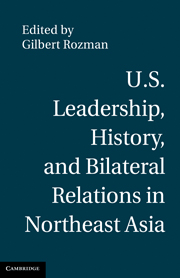Book contents
- Frontmatter
- Contents
- List of Contributors
- Acknowledgments
- U.S. Leadership, History, and Bilateral Relations in Northeast Asia
- Introduction
- PART I HISTORICAL MEMORIES AND BILATERAL TIES WITH ALLIES
- PART II HISTORICAL MEMORIES, JAPANESE–SOUTH KOREAN RELATIONS, AND U.S. VALUES
- 4 Japan–South Korea Relations and the Role of the United States on History
- 5 Getting Away or Getting In?
- 6 U.S. Strategic Thinking on the Japanese–South Korean Historical Dispute
- PART III HISTORICAL MEMORIES, SINO–SOUTH KOREAN RELATIONS, AND U.S. VALUES
- Index
5 - Getting Away or Getting In?
U.S. Strategic Options in the Historical Controversy between Its Allies
from PART II - HISTORICAL MEMORIES, JAPANESE–SOUTH KOREAN RELATIONS, AND U.S. VALUES
Published online by Cambridge University Press: 01 March 2011
- Frontmatter
- Contents
- List of Contributors
- Acknowledgments
- U.S. Leadership, History, and Bilateral Relations in Northeast Asia
- Introduction
- PART I HISTORICAL MEMORIES AND BILATERAL TIES WITH ALLIES
- PART II HISTORICAL MEMORIES, JAPANESE–SOUTH KOREAN RELATIONS, AND U.S. VALUES
- 4 Japan–South Korea Relations and the Role of the United States on History
- 5 Getting Away or Getting In?
- 6 U.S. Strategic Thinking on the Japanese–South Korean Historical Dispute
- PART III HISTORICAL MEMORIES, SINO–SOUTH KOREAN RELATIONS, AND U.S. VALUES
- Index
Summary
South Korea and Japan are the two key allies for the United States in Northeast Asia. Each has been an ally for more than fifty years, and more than forty years have passed since the two countries normalized diplomatic relations in 1965. Considering the long period of working together under the U.S. umbrella, it would be expected that the two nations had themselves become allied. However, they still remain awkward partners, referring to the other as “geographically close but emotionally distant.” What prevents them from developing a full-fledged partnership is the historical controversy lingering between them. More than half a century after the end of Japanese colonial domination, historical memory is a stumbling block preventing closer political ties. This does not serve their interests well and also fails to support U.S. aims for the region, solidifying security partnerships and forging a values-based coalition.
During the cold war period, historical animosity between South Korea and Japan was overshadowed to a considerable degree because the need for security and economic growth spurred the two countries to cooperate against the potential communist threat to both. Security imperatives made the two countries work together, albeit usually indirectly through the filter of the United States. Victor Cha aptly called the relationship “alignment despite antagonism.” Antagonism did not disappear even in the face of a common set of enemies; yet they found a way to collaborate through strong U.S. encouragement and also due to some domestic political reasons in each country.
- Type
- Chapter
- Information
- Publisher: Cambridge University PressPrint publication year: 2010

